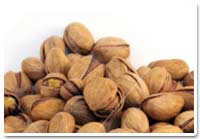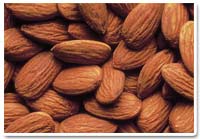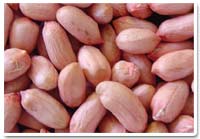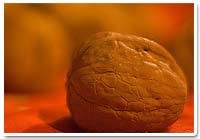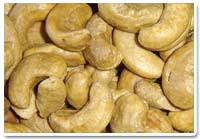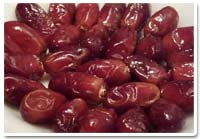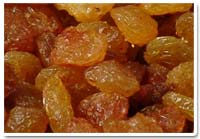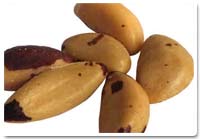Raisin
Introduction
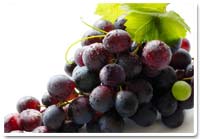
What are Raisins?
The most popular types of raisins are Sultana, Malaga, Monukka, Zante Currant, Muscat and Thompson seedless.
Sun drying generally occurs in the vineyards in September: clusters of grapes are spread in an even layer on paper trays that lie on the ground in the rows between the vines.
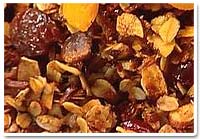
Etymological Background
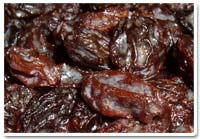
Historical Background
The practice of drying grapes into raisins has been known since the ancient times. Raisins are known to have been produced in Persia and Egypt as early as 2,000 BC, with one of their earliest mentions being in the Old Testament.
Archaeological evidence from the prehistoric times prove this assumption correct that they were not only consumed but also used for decorations as murals in the Mediterranean region of Europe. They were highly prized by the ancient Romans, who adorned their places of worships with them and used them as barter currency and as prizes for the winners of sporting events. In addition, raisins were an integral item on the menus at Bacchanalian feasts. From ancient Rome, the practice of drying grapes into raisins subsequently spread throughout the world.
At present the largest commercial producers of raisins are California, Australia, Turkey, Greece, Iran and Chile.
Selection and Storage of Raisins
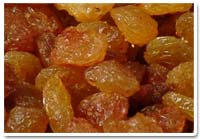
Once raisins are opened one must store them in a tightly sealed container in the refrigerator. Air in the container can rob the raisins of moisture, and can lead to prompt sugar crystallization on the fruit’s surface. If your raisins dry out, revitalize them by steaming them over boiling water for a few minutes.
The Nutritional Value Of Raisins
Raisins are the best source of quick energy, as they contain 70 percent pure fructose, which gets digested by the body easily and gives instant energy.
The Nutritional Value Of Raisins
Raisins are dried grapes and they are a good source of:
- fibre,
- potassium,
- iron,
- calcium,
- and some B vitamins.
Other Health Benefits
- fat free,
- cholesterol free,
- rich source of antioxidants,
- low in sodium,
- contain natural sugar (fructose), and
- no preservatives are used to keep them fresh.
Other Benefits
- Having antioxidant properties, raisins help keep the blood clean and flowing, by getting rid of al the impurities
- Raisins are believed to be good for bone density and have been associated with lower risk of osteoporosis in women
- The phytonutrients and olenolic acid present in raisins makes them beneficial for the health of teeth and gums
- Raisins are good for eyes and have been found to be helpful in prevention of macular degeneration
- Being high in calories, but not fats, raisins are a very good source of energy, especially for children and athlete
- Raisins are a good source of fiber and can help cure constipation. For the purpose, boil raisins in a saucepan of water, strain the liquid and drink it
- Studies claim that raisins contain additional nutritive compounds that can protect against heart disease and colon cancer.
Some Quick Serving Tips
- Raisins are a great addition to homemade granola or can be sprinkled over any breakfast cereal, hot or cold
- Raisins go well in most baked goods. Add them to bread, muffins and cookies
- Add raisins, almonds, peppers and onions to brown rice to make a tasty side dish
- Raisins’ sweetness and texture make them a great addition to poultry stuffing
- Mix raisins with your favorite nuts for a high-energy, protein and fiber-packed homemade snack or trail mix.






